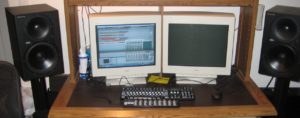If you’re like me, you don’t work from home that often. While I work mostly on my computer, I do collaborate a whole lot, so it’s not typical (I’m a software developer). Or perhaps you’ve never done it. However, there are days where I can’t go to the office, and it is advantageous to be able to be productive from home. Here are a few lessons I’ve learned (mostly the hard way).

Ahead of time: Equipment
Prepare by getting a work setup at home similar to what you use in the office. For example, I am accustomed to using an ergonomic keyboard, a decent mouse, and an external monitor. My tiny laptop keyboard and touchpad aren’t going to cut it, and I’m certainly more productive with a 2nd monitor – especially one bigger than the 15″ display on my laptop.
Now, a keyboard and mouse aren’t going to break the bank, especially if you are less picky (and carpal-tunnel prone) than I am. But for many folks, shelling out a few Benjamins for a display you don’t use every day can be hard to swallow. A few things to keep in mind: It doesn’t have to be as big, fancy, or new (many manufacturers have outlet sites with good deals) as what you use every day at the office. It’s tax deductible. If you use it enough, you might get your employer to spring for it. Doesn’t hurt to ask. My current set-up uses a pair of CRTs I got for (literally) nothing several years ago. I’ll modernize opportunistically, or when I work from home more.
Ahead of time: Space
The kitchen table or living room sofa* can suffice for an hour or two, but ideally, you can set aside a place in your house that is more-or-less designed with work in mind. Ideally, you can create a space to work that is free from distractions, but perhaps stimulating and inspiring. This may be your greatest constraint. My current arrangement has me in the basement, which is less than ideal in terms of atmosphere, but the most out-of-the-way in terms of distractions.
 You should be able to work there for long periods. Think about seating (consider getting a decent office chair), ergonomics (a desk that’s the proper height), temperature, lighting, and noise .
You should be able to work there for long periods. Think about seating (consider getting a decent office chair), ergonomics (a desk that’s the proper height), temperature, lighting, and noise .
Keep in mind what non-computer facilities you use at the office that might be helpful working at home. I like to have a dry-erase board handy, but I don’t find myself using sticky notes as much as I do at the office. Do you need a telephone, or perhaps a headset for your cell phone or VOIP (e.g. Skype).
Be Prepared
If your employer gave you a laptop, be in the habit of taking it home! Unless of course, working at home is not part of your arrangement. In that case, you don’t need to read this, do you? You don’t necessarily need to lug it back and forth every day, especially if you don’t use it off-hours, and you’re 100% confident you’ll be back in the office the next business day. The key is to be in the habit of thinking about taking it with you. If there is a strong likelihood you’ll need it, take it. Things that make it more likely you’ll have to work from home without warning are:
- Weather. If, like me, you live in the south where the temperature annoyingly waffles above and below freezing during winter days, you’ll have at least one day during the winter season where you can’t (or aren’t allowed to) drive to the office.
- Kids. If you have ’em, plan on being surprised with an illness or school closing.
- Other dependents in your household. Children aren’t the only ones who have unforeseen needs. It’s life, plan on it.
- Long commute. You see the traffic report that the world is a parking lot between you and your office. How much sanity would you gain if you could say “I’m just going to work from here until it lets up”, and actually be able to work effectively?
Dress the part
One of the perks of working from home is not having to dress like you’re going to the office. This is especially nice if you have to dress up much for work. However, for many folks I know, it helps to go through a morning routine just like you were going to the office. Shower, shave, dress, eat, etc. This can help you be in mental “work mode.”
What have you learned trying to work at home? What works for you?
*I finished this post on the sofa. Love technology :).